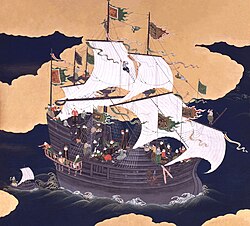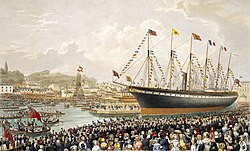Globalization
Globalization is the spread of products, technology, information, and jobs across nations.
Definition
It is a term which may be used broadly to mean doing things as distant people do them, or more narrowly to mean complying to global standards in economy, politics, culture, education, environment or other matters. It describes the way countries and people of the world interact and integrate. Many things have become globalized as people come into contact.
Economic globalization is how countries are coming together as one big global economy,[1] This is all making international trade easier. In the late 20th century, many people agreed to lower tariffs, or taxes on goods that are imported from other countries. Telegraphy and other communication technologies have helped people to buy and sell products from around the world, thus bringing globalization. Herman E. Daly has said that there is an important difference between internationalization and globalization. Internationalization is about nations working together for the same goals. These are things like treaties, alliances, and other international agreements. Globalization is about international trade that are being less blocked by national borders.
Political globalization is how institutions and countries can influence the whole world. The United Nations is an example of globalization because most countries of the world are members of its General Assembly. This international organization can make countries follow rules and apply economic sanctions to a country that doesn't. This means the countries in the U.N will punish them by not talking or trading with them, so they don't benefit from globalization.
Cultural globalization is how culture is becoming homogeneous, which means that people from all over the world act in similar way. For example, many people around the world write with the Latin alphabet, wear T-shirts and jeans and watch Hollywood movies and other media.
Criticism
Some people, like Noam Chomsky, do not like globalization because they feel it only helps rich people get richer by making poor people poorer. Offshore outsourcing, such as a company hiring workers in a developing country, is often a part of globalization. This sometimes means that some people in a developed country lose their jobs. Joseph Stiglitz said that international groups like the World Bank and the International Monetary Fund (IMF) have made it harder for poorer nations to get richer. Globalization also means that problems from other countries will affect your country. For example, the Great Depression of the 1930s started in the United States but affected the entire world.
Many countries also dislike it when international organizations such as the United Nations tell them what to do. However they obey to avoid sanctions. Many people also criticize the fact that globalization means that fewer people are deciding what brands, like Coca-Cola and McDonald's, taking over smaller, local shops and businesses. They criticize the fact that powerful countries have bigger influence on world culture than others. For example, the United States is the biggest cultural exporter, which means that countries around the world are becoming like the United States. However, this hurts local cultures. Jean Baudrillard believes that globalization hurts local cultures and is the cause of most terrorism. He also believes that most supporters of globalization just want to stay in power.[2]
Gregory Meyjes interprets globalization as a largely hegemonic, unequal process of socio-cultural imposition. Questioning the various processes (economic, political, cultural) by which globalization or globalisation has favored rapid Anglo-cultural dominance over a more gradual, egalitarian evolution towards an inclusive world civilization, Meyjes argues for cultural policies that support "ecological" relations between local ethnocultural traditions, by protecting cultural specificity in the short term and allow as many cultural groups as possible to organically contribute to the whole. At the global level, Meyjes therefore proposes the term universalization or universalisation to denote a process of (largely) non-imposed socio-cultural exchange between state-level and sub-state-level groups and "nations" – i.e. a transnational process that informs the gradual emergence of a universal civilization.
Support
Others, like Thomas Friedman, believe that globalization can bring people together and make everyone richer without getting rid of local cultures. People who support globalization also believe that it makes war less likely because it is bad for business.[3] Francis Fukuyama also argued that globalization would eventually lead to a system of world governance which would cause wars to end.[4]
Many believe that globalization helps out poorer nations by bringing them business. A report by the World Bank said that poverty in India and Indonesia was cut in half because of globalization. The report also said that people in poorer nations are living longer and better because they were making more money.[5]
Globalization Media
The 13th century world-system, as described by Janet Abu-Lughod
Portuguese carrack in Nagasaki, 17th-century Japanese Nanban art
The Silk Road in the 1st century
Native New World crops exchanged globally (clockwise): Maize, tomato, potato, vanilla, rubber, cacao, tobacco
Lisbon in the 1570s had many Africans due to the Atlantic slave trade.
The 1843 launch of the Great Britain, the revolutionary ship of Isambard Kingdom Brunel
During the 19th and early 20th centuries, the United Kingdom was a global superpower.
D.H. Comet, the world's first commercial jet airliner, entered service in 1949.
With a population of 1.4 billion, China is the world's second-largest economy.
Related pages
References
- ↑ Daly, Herman (1999). "Globalization versus Internationalization - some implications" (PDF). Ecological Economics. Elsevier. pp. 31–37.
- ↑ Baudrillard, Jean (2002). "The Violence of the Global". Power Inferno. Galilee. pp. 63–83. Archived from the original on 2009-01-30. Retrieved 2008-08-25./
- ↑ The World is Flat (ISBN 1-59397-668-2), Thomas L. Friedman, pg 421
- ↑ Fukuyama, Francis. (1989) The End of History?[dead link]. The National Interest,
- ↑ The World Bank (August 2000). "Poverty in an Age of Globalization" (PDF).
More Reading
- Peter Berger, Four Faces of Global Culture[dead link] (The National Interest, Fall 1997).
- Friedman, Thomas L. (2005). The World Is Flat. New York: Farrar, Straus and Giroux. ISBN 0-374-29288-4.
- Kitching, Gavin (2001). Seeking Social Justice through Globalization. Escaping a Nationalist Perspective. Penn State Press. ISBN 0-271-02162-4. Archived from the original on 2007-11-28. Retrieved 2008-08-25.
- Mander, Jerry; Edward Goldsmith (1996). The case against the global economy : and for a turn toward the local. San Francisco: Sierra Club Books. ISBN 0-87156-865-9.
- Steger, Manfred (2017). Globalization: A Very Short Introduction. Oxford, New York: Oxford University Press. ISBN 978-0-19-8779551.
- Stiglitz, Joseph E. (2002). Globalization and Its Discontents. New York: W.W. Norton. ISBN 0-393-32439-7.
- Wolf, Martin (2004). Why Globalization Works. New Haven: Yale University Press. ISBN 978-0300102529.









